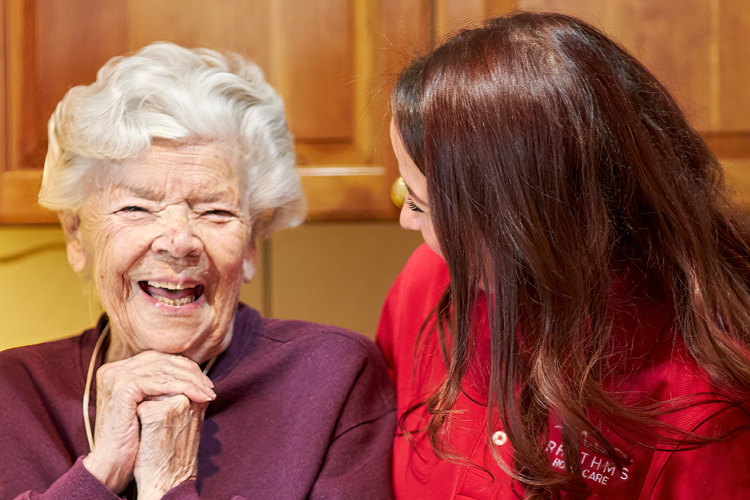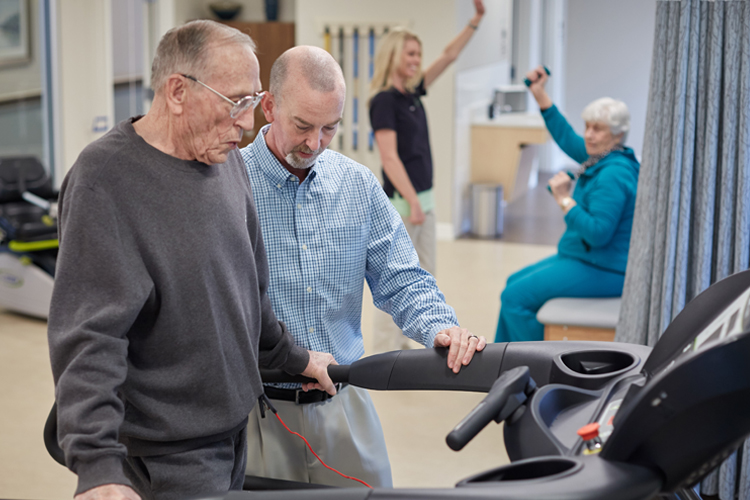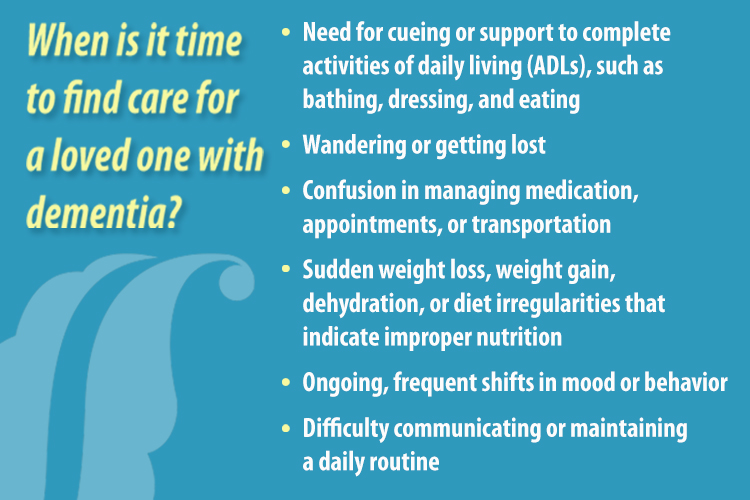Understanding the Various Types of Dementia Care
Senior Living
Posted: November 8, 2023
For individuals living with dementia, supportive care can improve the quality of daily life, for both the individual whose cognitive abilities are changing and for caregivers. Dementia progresses at different rates, so exploring the difference between available dementia care and support options early is essential.
Homecare assistance, adult day programs, or an assisted living memory support neighborhood, often called “memory care,” can offer just the right support to someone who needs frequent cueing and support with meals, transportation, or dressing. However, recent research shows individuals with advancing dementia, additional complex medical issues, or who have experienced frequent infections or health declines benefit from the expertise of a skilled nursing memory support neighborhood.
What are the different types of dementia care?

- Home Care: Home care providers can help with activities of daily living (ADLs), meal preparation, companionship, and transportation. Home care is scheduled in advance for a few hours a day or week.
- Adult Day Programs: Adult Day Programs provide engaging programming for older adults and respite for caregivers to work, handle personal business, or rest while knowing their loved one is well cared for. Some Adult Day Programs have staff members who are trained in dementia care and offer programming tailored for those living with dementia.
- Assisted Living: Assisted living communities typically offer an apartment furnished with the resident’s belongings, meals, help with ADLs, and laundry service. Residents enjoy a range of enriching daily programs, social engagement opportunities, and outings. Care team members are on hand to support with bathing, dressing, and coordination for medical appointments.
- Assisted Living Memory Support: Memory support neighborhoods offer programming and oversight specialized to residents living with the ever-changing needs of dementia. Care partners are specially trained to meet residents along their individual dementia journeys. This can be a stand-alone community or part of a larger continuum of care.
- Skilled Nursing Memory Support: These neighborhoods offer 24-hour skilled nursing care for those who need the highest level of medical care. In addition to specialized cognitive support and programming, experienced licensed nursing staff can quickly identify and treat more serious medical needs.
- Continuing Care Retirement: These communities offer support for living with dementia at all levels of living, from independent living apartments to rehabilitation and skilled nursing care. They offer the ability to progress through levels of living as needs change, and for couples to live on the same campus even if their support needs differ.
Why is skilled nursing memory support a good option for some people living with dementia?
Skilled nursing memory support neighborhoods – such as Someren Glen’s* – can be an ideal fit for individuals experiencing dementia along with other conditions that require ongoing medical oversight by a nurse. These include:
- Heart disease
- Diabetes
- Stroke
- Parkinson’s disease
- Multiple sclerosis
- Cancer
- Alzheimer’s disease or dementia with advanced symptoms
Recent research from the National Institute on Aging at the National Institutes of Health confirms that residents with dementia have better outcomes in nursing homes when they reside in a neighborhood dedicated to specialized dementia care.
 Skilled nursing memory support communities offer a variety of benefits, including:
Skilled nursing memory support communities offer a variety of benefits, including:
- 24-hour skilled nursing care
- Routine rounds by a physician
- Easy access to a variety of medical services, such as physical therapy, occupational therapy, and speech therapy
- Specialized care for people with dementia, including behavioral management and close monitoring of wandering
- A safe and supportive environment for caregivers and family
*In addition to a dedicated skilled nursing memory support neighborhood, Someren Glen also offers generalized support for those living with mild dementia in other neighborhoods within our continuing care community.
When is it time to seek more care for a loved one with dementia?

Below are some common signs it may be time to seek more care for a loved one:
- Need for cueing or support to complete activities of daily living (ADLs), such as bathing, dressing, and eating
- Wandering or getting lost
- Confusion in managing medication, appointments, or transportation
- Sudden weight loss, weight gain, dehydration, or diet irregularities that indicate improper nutrition
- Ongoing, frequent shifts in mood or behavior
- Difficulty communicating or maintaining a daily routine
If you are concerned about your loved one’s cognitive abilities or behavior, talk to their doctor. They can assess needs and make recommendations for care. This resource from the Alzheimer’s Research UK provides a better understanding of brain changes that accompany dementia.
How does the Rhythms Dementia Services philosophy enhance all levels of living?
Christian Living Communities’ unique Rhythms dementia care philosophy is a resident-centered approach that adapts to the current experience and cognitive abilities of the person living with dementia. Each person is on their own unique dementia journey. Rhythms-trained team members follow these principles:
- Relationship-based connection: Relationships are essential to well-being. At Someren Glen, care partners develop strong relationships with residents and learn about their individual needs and preferences.
- Rhythms of life: We recognize people thrive on routine and predictability. Care partners work to create a daily routine for residents that includes meaningful and enjoyable activities.
- Person-centered care: We focus on the individual resident. Caregivers develop customized care plans tailored to the resident’s current cognitive abilities and individual needs. As the resident’s needs change, so does their care plan.
- Sensory engagement: We help residents stay connected to the world around them through music, art, touch, and other sensory modalities to stimulate senses and promote well-being.
When considering memory support options, be sure to visit multiple communities and meet the team members who will be caring for your loved one. Ask about how care offerings might adapt as care needs change over time. Resources from Medicare.gov and the Alzheimer’s Association’s 24/7 Helpline can also connect you with communities near you.
Understanding how to distinguish different levels of dementia care, when nursing care can be the best quality and safest care for a loved one, and the unique philosophy and services offered by a community will help families at every stage of the dementia care journey. Contact the experienced team at Someren Glen to learn more about the continuum of care available in this community and how it may be the right fit for you or your loved one.


 Skilled nursing memory support communities offer a variety of benefits, including:
Skilled nursing memory support communities offer a variety of benefits, including: